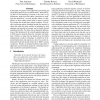Free Online Productivity Tools
i2Speak
i2Symbol
i2OCR
iTex2Img
iWeb2Print
iWeb2Shot
i2Type
iPdf2Split
iPdf2Merge
i2Bopomofo
i2Arabic
i2Style
i2Image
i2PDF
iLatex2Rtf
Sci2ools
CCR
2004
2004
Preventing Internet denial-of-service with capabilities
In this paper, we propose a new approach to preventing and constraining denial-of-service (DoS) attacks. Instead of being able to send anything to anyone at any time, in our architecture, nodes must first obtain "permission to send" from the destination; a receiver provides tokens, or capabilities, to those senders whose traffic it agrees to accept. The senders then include these tokens in packets. This enables verification points distributed around the network to check that traffic has been certified as legitimate by both endpoints and the path in between, and to cleanly discard unauthorized traffic. We show that our approach addresses many of the limitations of the currently popular approaches to DoS based on anomaly detection, traceback, and pushback. Further, we argue that our approach can be readily implemented in today's technology, is suitable for incremental deployment, and requires no more of a security infrastructure than that already needed to fix BGP's ...
| Added | 16 Dec 2010 |
| Updated | 16 Dec 2010 |
| Type | Journal |
| Year | 2004 |
| Where | CCR |
| Authors | Thomas E. Anderson, Timothy Roscoe, David Wetherall |
Comments (0)

